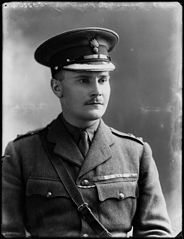Working on the Traces through Time project has meant spending many months staring at long lists of names. So much so that I feel I know many of the people who served in the First World War, especially those appearing in our Admiralty and AIR series.
Traces through Time is all about linking people’s records together, and the more unusual someone’s name is the more confident we are that two records containing that name are referring to the same person. So, wonderful names like Sylveanus Jinkins Orford and Fawcett Hagbert Bugge seem as unique as a set of fingerprints, at least for a generation or two. However, names don’t necessarily need to be unusual to make them unique; some people just have a lot of them, like Albert Edward Christian George Andrew Patrick David Wright. Of course rare names don’t necessarily signify uniqueness – of the 13 Spreadboroughs who served in the Royal Navy during WWI, two were called Bertie and a third was called Herbert. Without taking into consideration other information, we could easily fall into the trap of thinking they are one and the same.
When I think of names in our catalogue I like to think of what is recorded there as being the result of a chain of events in the lifetime of the record. I imagine recruitment offices as rather loud and busy places full of people with a wide variety of names, all having different ways of spelling those names, and pronouncing them in accents which may not be easily understandable to the recruitment officer filling in the application form. No more is this exemplified than by Frithy of Heaton Cooper who sounds like an aristocratic friend of Bertie Wooster, but was actually called Frithiof. Is it any wonder that Walter Henry Heard was also recorded elsewhere as William Henry Heard (perhaps Mr. Heard was misheard), or that Robert William Franklin is called Albert in another record? It may be that Albert is his middle name, but there is a definite pattern of substituting names beginning with the same initial, or with a similar sound appearing in different records (Edward for Edgar or Edwin, Herbert for Harold, and so on).

Bernard Freyberg, 1919 (Bassano Ltd, view creative commons licence)
One nice example of this phenomenon is the case of Bernard Cyril Freyberg, 1st Baron Freyberg, who is variously recorded as Bernard Cyril Freyberg, Bernard Cecil Freyberg and Bernard Cyril Freyburg. Actually if we look at the penultimate page of his Royal Naval Record of Service we see the crossing out of Cecil and the replacement with Cyril. This was not reflected on the typed record card which was eventually transcribed to prepare data for The National Archives’ online catalogue, Discovery. Here we have an example of not only an incorrect middle name but also a misspelling of the surname (also corrected in the penultimate page of the record). Spelling differences open up a whole can of worms, and how we deal with them to improve the find-ability of these records is right at the centre of Traces through Time. I will save that for a later blog.

Correction of Cecil to Cyril (catalogue reference: ADM 339/3/632)
What else can we learn from exploring names? Well if we bring in the date of birth we see some nice patterns emerging. Over half of Valentines are unsurprisingly born on 14 February, and we also find a large proportion of Noels born on 25 December, Guys on 5 November, a spike of Patricks on 17 March and you can probably guess in which month a third of Mays are born. The months of March and April seem to produce more Violets and Roses than other months. A special mention must, as we enter December, go to those with the forename Christmas. I found 20 Christmases in ADM 188 and only 11 were born during the Yuletide period. Perhaps it is Christmas all year round in some households. Take James Christmas Palmer, for example, who was born in June 1852 and joined the Navy as a boy in 1868. Which ship was he assigned to? H.M.S. Reindeer of course. We also have the brilliantly named Christmas Holliday, born in November 1900. His parents were obviously looking ahead to a festive break.

A wordcloud showing dates of birth for men named Valentine, Noel and Guy – the bigger the text the more common the date
What I found particularly interesting about the relationship between names and date of birth was the correlation with other events. More boys named Jubilee were born in the summers of 1887 and 1897 than at other times, and the latter year was also a popular time to name your daughter Victoria, as was 1899 when the Queen turned 80. It is the Boer War which really appears to have caught the imagination of parents though, with names such as Mafeking, Dundonald, Baden, Powell, Kimberley and Pretoria becoming popular around the times of major victories.
I do wonder in more modern times whether similar patterns would emerge. Did the Falkland’s War create a new generation of Scotts or Stanleys? Perhaps the current popularity of Scandinavian television dramas will give us a famous Hagbert to inspire parents. It wouldn’t surprise me if 2012 brought renewed popularity for Elizabeth, but did Jubilee have a resurgence too?
And if you find yourself naming a baby near the end of the month… do at least consider Christmas.

I think you’ll find that the reason the name Christmas does not always follow your pattern is that in some/many cases it falls into the pattern of surname used as first/middle name in later generation.
This is a thoroughly enjoyable read! I love the variety of interesting names and scenarios mentioned, as well as the image created of the noisy recruitment office. I look forward to reading the next instalment.
[…] Working on the Traces through Time project has meant spending many months staring at long lists of names. So much so that I feel I know many of the people… Go to Source […]
A very difficult task of matching records has been beautifully humanized. A great blog and a fascinating reflection of society at the time. Eagerly looking forward to your next blog.
Fascinating and very well-written. The fact that these names reflect real people who each lived their individual lives playing their part the great drama of humanity. Beautiful. I look forward to what is to follow
Word left out
….their part in the great drama of humanity….
Whilst linking people from across Discovery could be worthwhile if the names are fully listed and in the case of the First World War they are not, and one should not assumed that all the records are in the WO, ADM and Air series. It does make me wonder why there is a need for the project given that with some knowledge you can find the information. If you take for example Winston Churchill, is it Churchill or Spencer-Churchill (with or without the dash) and my experience of the wholesale errors in the transcription/original Admiralty errors in ADM records (ADM 363 has about 2000 known errors and ADM 362 is just slightly better).
This project does remind me of a similar genealogical one by Scotsorigins where they ended up listed some of my ancestors wrongly because of the birth dates from 1819-1871 and allocating the siblings as the parents.
I had to laugh at the boy being assigned to HMS Reindeer. Too bad it wasn’t Christmas Holliday. I do research in New London, Connecticut, and have run across an extremely fertile clan of Rogerses, who followed the then-common practice of reusing names. It was so confusing even at the time that they were frequently distinguished in a local diary (Diary of Joshua Hempstead 1711-1758) by occupation or distinguishing characteristic, such as James Rogers Baker, John Rogers Carpenter, and my favorite, Jonathan Rogers Stick. He had a wooden leg. I often wonder how many are mis-indexed under those names in works that took the information from Hempstead.
How lovely to see my husband’s grandfather mentioned – Christmas Holliday! You may further smile if I mention his wife was called Minnie, and he had a brother called Noel!!!
Nice topic all will be in the name .